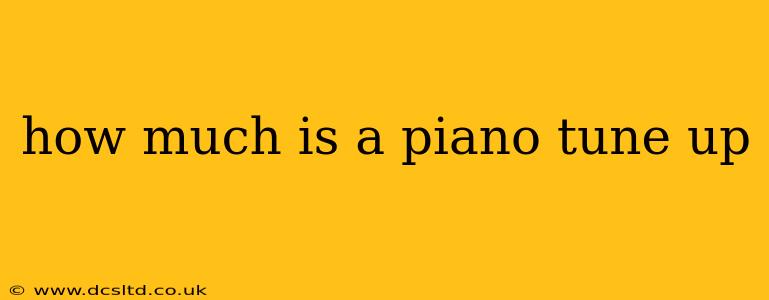How Much is a Piano Tuning? A Comprehensive Guide
The cost of a piano tuning varies significantly depending on several factors. There's no single answer to "how much is a piano tune-up," but understanding these factors will help you get a realistic estimate and avoid unexpected costs. This guide will break down the pricing, explain what influences it, and answer frequently asked questions.
What Factors Influence Piano Tuning Costs?
Several factors contribute to the final price of a piano tuning. These include:
-
Location: Tuning costs in major metropolitan areas tend to be higher than those in smaller towns or rural areas due to higher overhead and demand. Technicians in densely populated areas may have busier schedules and higher travel expenses.
-
Technician Experience: Experienced, highly skilled piano technicians often charge more than those with less experience. Their expertise and knowledge are valuable, especially for older or more delicate instruments.
-
Type of Piano: Tuning an upright piano generally costs less than tuning a grand piano. Grand pianos are larger, more complex, and require more time and effort to tune accurately.
-
Condition of the Piano: A piano that's severely out of tune or needs significant repairs before tuning will likely incur additional costs. The technician might need to spend more time addressing issues beyond a standard tuning.
-
Services Included: Some technicians offer additional services beyond basic tuning, such as voicing (adjusting the tone), regulation (adjusting the action), or repairs. These add-on services will increase the overall cost.
How Much Does a Piano Tuning Typically Cost?
While prices vary, a basic piano tuning typically ranges from $100 to $300 in many areas. However, you might find prices at the lower end of this range in smaller towns or for simpler instruments, while more expensive tunings, particularly for grand pianos or those requiring additional work, can reach $400 or more. Always get a quote from the technician before scheduling the service.
How Often Should I Get My Piano Tuned?
How often should I tune my piano? This is a common question. Ideally, a piano should be tuned at least once a year, especially if it is regularly played. However, if the piano is in a location with significant temperature or humidity fluctuations, more frequent tuning might be necessary. Newly purchased pianos might need more frequent tuning initially as they settle into their environment.
What's the Difference Between Tuning and Regulation?
What's the difference between tuning and regulating my piano? Tuning involves adjusting the pitch of the strings to ensure they are all in harmony. Regulation, on the other hand, involves adjusting the mechanical parts of the piano, such as the hammers, keys, and dampers, to ensure the instrument plays smoothly and consistently. Regulation is typically more expensive than a standard tuning.
Are there any DIY methods to tune my piano?
Can I tune my piano myself? It's strongly recommended to avoid attempting to tune your piano yourself. Piano tuning is a highly specialized skill requiring specialized tools and expertise. Improper tuning can damage your instrument, potentially leading to costly repairs.
Finding a Qualified Piano Technician
Finding a reputable and qualified piano technician is crucial. Check online reviews, ask for referrals from music stores or teachers, and ensure the technician has the necessary experience and qualifications to work on your specific piano type.
In conclusion, the cost of a piano tuning is dependent on a variety of factors. Obtaining multiple quotes from qualified technicians in your area will help ensure you get the best price and the quality service your instrument deserves. Remember to factor in the added cost of any needed repairs or additional services beyond the basic tuning.
